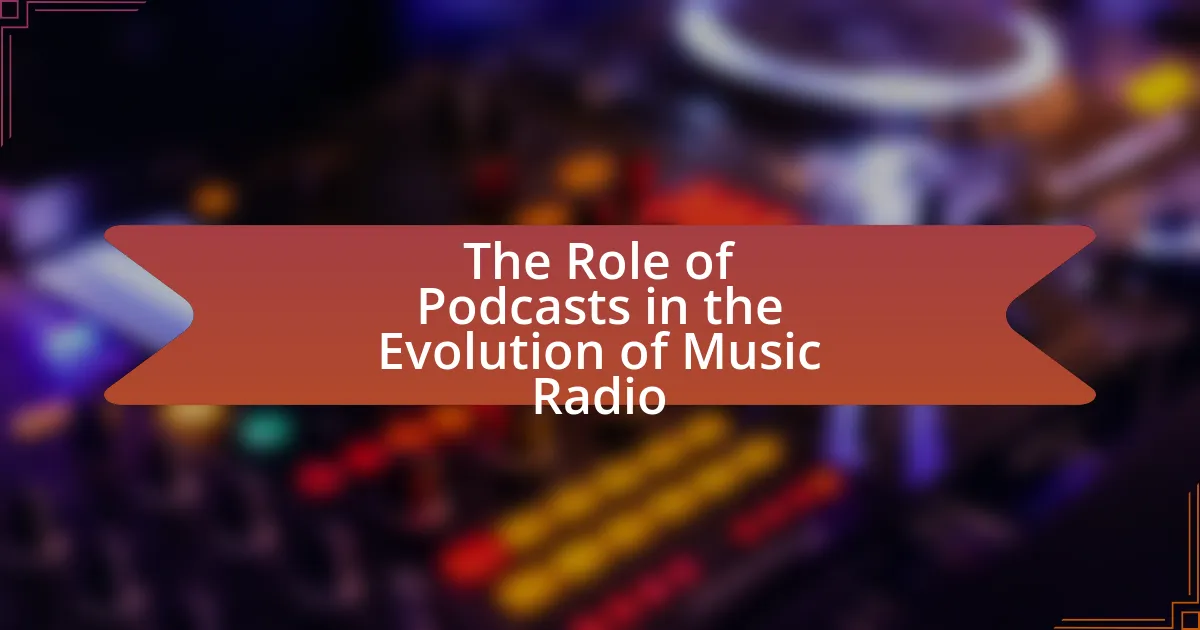Localized content is essential for global music radio networks as it enhances listener engagement and cultural relevance. By tailoring programming to local tastes, languages, and cultural nuances, these networks can foster deeper connections with their audiences, leading to increased loyalty and satisfaction. Research indicates that a significant majority of listeners prefer music that resonates with their local culture, which not only supports regional artists but also contributes to the diversity of the global music landscape. The article explores the importance of localized content, its impact on listener engagement, the challenges faced in localization, and strategies for effective implementation, highlighting the role of technology and audience feedback in shaping successful localized content strategies.

What is the Importance of Localized Content in Global Music Radio Networks?
Localized content is crucial in global music radio networks because it enhances listener engagement and cultural relevance. By tailoring programming to reflect local tastes, languages, and cultural nuances, radio networks can foster a deeper connection with their audience. For instance, a study by the International Federation of the Phonographic Industry (IFPI) found that 70% of listeners prefer music that resonates with their local culture, indicating that localized content can significantly boost listener loyalty and satisfaction. Additionally, localized content allows radio networks to effectively promote regional artists and genres, thereby supporting local music scenes and contributing to the diversity of the global music landscape.
Why is localized content crucial for global music radio networks?
Localized content is crucial for global music radio networks because it enhances listener engagement and cultural relevance. By tailoring programming to local tastes, preferences, and languages, radio networks can foster a deeper connection with their audience. For instance, a study by the International Federation of the Phonographic Industry (IFPI) found that 70% of listeners prefer music that reflects their local culture. This indicates that localized content not only attracts more listeners but also increases loyalty, as audiences feel represented and understood.
How does localized content enhance listener engagement?
Localized content enhances listener engagement by making the material more relevant and relatable to the audience’s cultural and geographical context. When radio networks tailor their content to reflect local languages, traditions, and issues, they foster a stronger emotional connection with listeners. Research indicates that 72% of consumers prefer to engage with content in their native language, which significantly increases their likelihood of interaction and loyalty to the brand. This localized approach not only improves listener satisfaction but also drives higher participation rates in community events and promotions, ultimately leading to increased audience retention and growth for radio networks.
What role does cultural relevance play in localized content?
Cultural relevance is crucial in localized content as it ensures that the material resonates with the target audience’s values, beliefs, and social norms. When content reflects the cultural context of its audience, it enhances engagement and fosters a sense of connection, leading to higher listener retention and satisfaction. For instance, a study by the Pew Research Center found that 78% of individuals prefer content that reflects their cultural identity, indicating that cultural relevance significantly influences audience preferences. This alignment not only improves the effectiveness of communication but also strengthens brand loyalty within diverse markets.
How does localized content impact the music industry?
Localized content significantly enhances the music industry’s ability to connect with diverse audiences. By tailoring music offerings to reflect local cultures, languages, and preferences, artists and labels can increase listener engagement and loyalty. For instance, a study by the International Federation of the Phonographic Industry (IFPI) in 2021 revealed that 70% of consumers prefer music that resonates with their local culture, leading to higher streaming numbers and sales for localized tracks. This trend demonstrates that localized content not only fosters a sense of community but also drives commercial success in the global music market.
What benefits does localized content provide to artists and producers?
Localized content provides artists and producers with enhanced audience engagement and increased market reach. By tailoring music and messaging to specific cultural contexts, artists can resonate more deeply with local listeners, leading to higher listener loyalty and stronger fan bases. For instance, a study by the International Federation of the Phonographic Industry (IFPI) found that localized music content can boost streaming numbers by up to 30% in targeted regions. This approach not only fosters a sense of community but also opens up opportunities for collaborations and partnerships within local markets, ultimately driving sales and revenue growth for artists and producers.
How does localized content influence music trends in different regions?
Localized content significantly influences music trends in different regions by catering to the cultural preferences and linguistic nuances of local audiences. This targeted approach allows music producers and radio networks to promote genres, artists, and songs that resonate with specific demographics, thereby shaping local music scenes. For instance, a study by the International Federation of the Phonographic Industry (IFPI) in 2021 highlighted that localized playlists on streaming platforms led to a 30% increase in the consumption of regional music genres, demonstrating how tailored content can drive engagement and popularity.
What challenges do global music radio networks face in localization?
Global music radio networks face significant challenges in localization, primarily due to cultural differences and varying listener preferences. These networks must navigate diverse musical tastes, languages, and cultural contexts, which can complicate content curation and programming. For instance, a song that is popular in one region may not resonate in another due to cultural nuances, leading to potential listener disengagement. Additionally, regulatory requirements and local broadcasting laws can vary widely, necessitating adaptations in content that may not align with the network’s global strategy. These factors collectively hinder the ability of global music radio networks to effectively localize their offerings while maintaining a cohesive brand identity.
What are the common obstacles in creating localized content?
Common obstacles in creating localized content include cultural differences, language barriers, and resource limitations. Cultural differences can lead to misunderstandings or misinterpretations of content, making it less relatable to the target audience. Language barriers complicate accurate translation and adaptation, potentially resulting in loss of meaning or context. Resource limitations, such as insufficient budget or lack of local expertise, hinder the ability to produce high-quality localized content. These factors collectively challenge the effectiveness of localized content in engaging diverse audiences in global music radio networks.
How can technology aid in overcoming localization challenges?
Technology can aid in overcoming localization challenges by providing tools for automated translation, real-time content adaptation, and audience analytics. Automated translation software, such as Google Translate and DeepL, enables quick and accurate translations of content, reducing the time and cost associated with manual localization. Real-time content adaptation tools allow radio networks to tailor programming to specific cultural contexts, ensuring relevance and engagement with local audiences. Additionally, audience analytics platforms, like Spotify for Artists, offer insights into listener preferences and behaviors, enabling networks to refine their localized content strategies effectively. These technological advancements facilitate a more efficient and responsive approach to localization in global music radio networks.
How can global music radio networks effectively implement localized content?
Global music radio networks can effectively implement localized content by collaborating with local artists, curating region-specific playlists, and incorporating local news and cultural events into their programming. This approach ensures that the content resonates with the local audience, fostering a sense of community and relevance. For instance, networks like BBC Radio 1 have successfully integrated local music scenes by featuring local artists and genres, which has led to increased listener engagement and loyalty. Additionally, research indicates that localized content can enhance listener satisfaction and retention, as audiences are more likely to connect with music and information that reflects their cultural context.
What strategies can enhance the effectiveness of localized content?
To enhance the effectiveness of localized content, employing culturally relevant themes and language is essential. This strategy ensures that the content resonates with the target audience’s values and preferences, leading to increased engagement. For instance, a study by the Localization Industry Standards Association found that 75% of consumers prefer content in their native language, highlighting the importance of language adaptation. Additionally, incorporating local artists and music styles can further strengthen the connection with the audience, as evidenced by successful global music radio networks that have tailored their playlists to reflect regional tastes.
How can audience feedback shape localized content strategies?
Audience feedback can significantly shape localized content strategies by providing insights into cultural preferences and listening habits. This feedback allows content creators to tailor programming that resonates with specific demographics, ensuring relevance and engagement. For instance, a study by the Pew Research Center found that 70% of listeners prefer content that reflects their local culture and interests, demonstrating the impact of audience preferences on content development. By analyzing feedback through surveys, social media interactions, and listener metrics, radio networks can adapt their offerings to better align with local tastes, ultimately enhancing listener loyalty and satisfaction.
What partnerships can be beneficial for creating localized content?
Partnerships with local artists, cultural organizations, and regional media outlets are beneficial for creating localized content. Collaborating with local artists ensures that the music reflects the cultural nuances and preferences of the target audience, enhancing authenticity. Cultural organizations can provide insights into local traditions and values, which can inform content creation and ensure relevance. Additionally, regional media outlets can help distribute the content effectively, reaching the intended audience more efficiently. These partnerships leverage local expertise and networks, which are crucial for successful localization in global music radio networks.
What are the best practices for creating localized content in global music radio networks?
The best practices for creating localized content in global music radio networks include understanding local cultures, engaging with local artists, and tailoring programming to regional preferences. Understanding local cultures ensures that content resonates with the audience, as cultural nuances significantly influence music tastes and listening habits. Engaging with local artists fosters community connections and promotes regional talent, which can enhance listener loyalty. Tailoring programming to regional preferences, such as incorporating local music genres and addressing local issues, increases relevance and listener engagement. These practices are supported by research indicating that localized content can lead to higher audience retention and satisfaction, as seen in case studies of successful global radio networks that prioritize local engagement.
How can radio networks measure the success of localized content?
Radio networks can measure the success of localized content through audience engagement metrics, listener feedback, and market research. Audience engagement metrics include tracking listener ratings, time spent listening, and social media interactions, which provide quantitative data on how well localized content resonates with the target demographic. Listener feedback, gathered through surveys and direct communication, offers qualitative insights into audience preferences and satisfaction levels. Market research, including demographic studies and competitive analysis, helps radio networks understand the effectiveness of localized content in attracting and retaining listeners compared to other stations. These methods collectively validate the impact of localized content on audience loyalty and market share.
What tools and resources are available for developing localized content?
Various tools and resources are available for developing localized content, including translation software, localization management platforms, and cultural adaptation services. Translation software like SDL Trados and MemoQ facilitates accurate language translation, while localization management platforms such as Smartling and Transifex streamline the process of adapting content for different markets. Additionally, cultural adaptation services provide insights into local customs and preferences, ensuring that content resonates with target audiences. These tools collectively enhance the effectiveness of localized content in global music radio networks by ensuring linguistic accuracy and cultural relevance.
What future trends should global music radio networks consider for localized content?
Global music radio networks should consider the integration of artificial intelligence and data analytics to tailor localized content effectively. By utilizing AI algorithms, networks can analyze listener preferences and regional music trends, allowing for a more personalized listening experience. For instance, a study by the International Federation of the Phonographic Industry (IFPI) in 2022 indicated that 70% of listeners prefer music that reflects their local culture and language. This data underscores the necessity for networks to adapt their programming to meet local tastes, enhancing listener engagement and loyalty. Additionally, incorporating user-generated content and local artist showcases can further strengthen community ties and promote regional talent, aligning with the growing trend of authenticity in media consumption.
How might emerging technologies influence localized content creation?
Emerging technologies significantly influence localized content creation by enabling more personalized and context-aware content delivery. Technologies such as artificial intelligence and machine learning facilitate the analysis of local audience preferences, allowing content creators to tailor their offerings to specific cultural and regional nuances. For instance, AI-driven algorithms can analyze listener data to identify trending topics and musical preferences in different locales, leading to more relevant programming. Additionally, advancements in mobile technology and social media platforms provide creators with tools to distribute localized content efficiently, reaching targeted audiences directly. This shift not only enhances listener engagement but also fosters a deeper connection between content creators and local communities, ultimately driving higher listener retention and satisfaction.
What shifts in listener preferences should be anticipated?
Listeners are anticipated to increasingly prefer localized content over generic programming in global music radio networks. This shift is driven by a growing desire for cultural relevance and personal connection, as evidenced by a 2022 survey from Nielsen Music, which found that 70% of listeners favor music that reflects their local culture and community. Additionally, the rise of digital platforms allows for tailored content that resonates with specific demographics, further emphasizing the importance of localized programming in attracting and retaining audiences.
What practical tips can help in the localization of content for global music radio networks?
To effectively localize content for global music radio networks, it is essential to understand the cultural preferences and language nuances of the target audience. This involves conducting thorough market research to identify popular music genres, local artists, and regional trends that resonate with listeners. Additionally, collaborating with local influencers and music experts can provide valuable insights into the community’s tastes and preferences.
Utilizing localized language in broadcasts, including slang and idiomatic expressions, enhances relatability and engagement. Furthermore, incorporating local events, festivals, and news into programming can create a stronger connection with the audience.
Data from the International Federation of the Phonographic Industry (IFPI) indicates that localized content significantly increases listener loyalty and engagement, demonstrating the effectiveness of these strategies in fostering a dedicated audience base.






